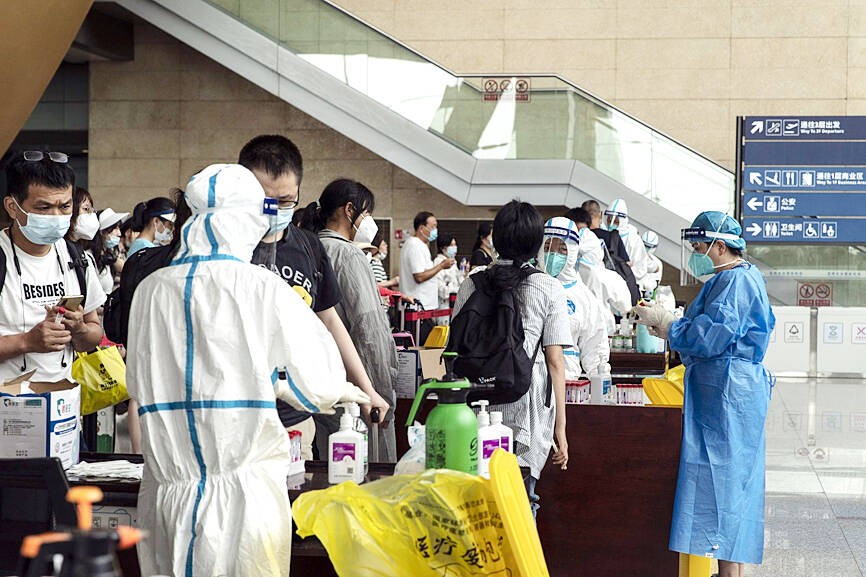China yesterday opened its borders for foreign students for the first time in more than two years, easing restrictions on their entry imposed in the early days of the COVID-19 pandemic.
Foreign nationals holding a Chinese residence permit for study or an APEC business travel card would be allowed to enter the country, the Chinese embassy in the US said in a statement on WeChat on Tuesday.
Similar statements were made by the Chinese embassies in Japan and India.

Photo: Bloomberg
While the country has been allowing some students to enter on an ad-hoc basis for some time, the move shows that Beijing is attempting to normalize aspects of the economy — while holding fast to its “zero COVID-19” approach.
Anyone entering China still faces one of the most intensive pandemic border regimes globally, with mandatory traveler quarantines still in place.
Allowing international students to return does not mean China has relaxed its strict pandemic control measures or that the government has abandoned its dynamic “zero COVID-19” policy, the state-run Global Times reported.
Lu Hongzhou (盧洪洲), a health commentator and president of the Third People’s Hospital in Shenzhen, said further shortening the quarantine period for inbound travelers in the short term is unlikely, the report added.
China still has the world’s toughest entry requirements, even after easing quarantine rules in June. Arriving travelers need to spend seven days in an isolation facility and then monitor their health at home for a further three days. Flights to the country are also limited.
The country welcomed 492,185 foreign students in 2018, low compared with the more than 1 million enrolled in the 2019-2020 academic year in the US, where international education is a significant industry.
Most of China’s students came from South Korea, followed by Thailand and Pakistan.

Indonesia was to sign an agreement to repatriate two British nationals, including a grandmother languishing on death row for drug-related crimes, an Indonesian government source said yesterday. “The practical arrangement will be signed today. The transfer will be done immediately after the technical side of the transfer is agreed,” the source said, identifying Lindsay Sandiford and 35-year-old Shahab Shahabadi as the people being transferred. Sandiford, a grandmother, was sentenced to death on the island of Bali in 2013 after she was convicted of trafficking drugs. Customs officers found cocaine worth an estimated US$2.14 million hidden in a false bottom in Sandiford’s suitcase when

CAUSE UNKNOWN: Weather and runway conditions were suitable for flight operations at the time of the accident, and no distress signal was sent, authorities said A cargo aircraft skidded off the runway into the sea at Hong Kong International Airport early yesterday, killing two ground crew in a patrol car, in one of the worst accidents in the airport’s 27-year history. The incident occurred at about 3:50am, when the plane is suspected to have lost control upon landing, veering off the runway and crashing through a fence, the Airport Authority Hong Kong said. The jet hit a security patrol car on the perimeter road outside the runway zone, which then fell into the water, it said in a statement. The four crew members on the plane, which

Japan’s ruling Liberal Democratic Party (LDP) and its junior partner yesterday signed a coalition deal, paving the way for Sanae Takaichi to become the nation’s first female prime minister. The 11th-hour agreement with the Japan Innovation Party (JIP) came just a day before the lower house was due to vote on Takaichi’s appointment as the fifth prime minister in as many years. If she wins, she will take office the same day. “I’m very much looking forward to working with you on efforts to make Japan’s economy stronger, and to reshape Japan as a country that can be responsible for future generations,”

SEVEN-MINUTE HEIST: The masked thieves stole nine pieces of 19th-century jewelry, including a crown, which they dropped and damaged as they made their escape The hunt was on yesterday for the band of thieves who stole eight priceless royal pieces of jewelry from the Louvre Museum in the heart of Paris in broad daylight. Officials said a team of 60 investigators was working on the theory that the raid was planned and executed by an organized crime group. The heist reignited a row over a lack of security in France’s museums, with French Minister of Justice yesterday admitting to security flaws in protecting the Louvre. “What is certain is that we have failed, since people were able to park a furniture hoist in the middle of